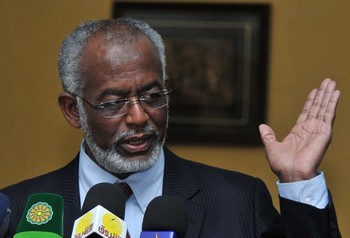Efforts to normalise US-Sudan relations stall
December 10, 2014 (KHARTOUM) – The Sudanese government has asserted difficulties facing the normalisation of ties with the United States and said that this effort is at a standstill because of Washington’s insistence on linking the improvement of relations to domestic Sudanese issues.

Washington calls for the resolution conflicts in the Blue Nile, South Kordofan and Darfur as a prerequisite for normalising ties.
Sudan’s foreign minister, Ali Kartri, said in a statement on his ministry’s plan for 2015 before parliament on Wednesday that visits by US special envoys to Khartoum had failed to achieve any real progress.
Karti announced the continuation of diplomatic efforts with the US to reach a common understanding on how to improve relations despite the renewal of sanctions.
He noted that they started a new approach to weaken the impact of sanctions by obtaining licenses through exemptions of certain dealings with the US in the fields of health, agriculture, education and training along with many of the technologies related to increasing food production.
Sudan’s top diplomat also revealed that the Russian Foreign Minister Sergei Lavrov directed Moscow’s mission at the United Nations to pursue Sudanese issues.
He said that Lavrov vowed to kill any move in the UNSC to take any action related to the subject of alleged rape cases in Tabit in North Darfur state.
A Darfuri media outlet based in the Netherlands reported accusations last month that Sudanese soldiers had raped some 200 women and girls in Tabit, a village 45km south-west of North Darfur capital El-Fasher.
Following these allegations, Sudanese authorities initially prevented a verification team from the UNAMID from probing the claim but allowed them to visit the area one week later.
After the visit UNAMID said it found no evidence confirming the mass rape claims.
However, Sudanese officials were angered by the remarks of UN officials who stressed the need for further investigation mentioning the heavy presence of military and police during the first probe.
Since then Sudan refused to authorize a second investigation and called publicly for an exit strategy for the joint mission from Darfur.
Karti said the government is in continued dialogue with a visiting UNSC delegation regarding UNAMID exit strategy, but stressed that this is not linked to the Tabit incident.
He accused unnamed circles of conspiring against the armed forces through Tabit claims and stopping the voluntary return IDP’s.
On relations with South Sudan, he accused Juba of obstructing the formation of civil institutions and police force in the disputed region of Abyei as well as inability to determine the zero line and the demarcation of borders in the region despite the agreements signed between the two countries since 2011.
Karti also criticized some of the actions and policies of the government saying it negatively affects the image of Sudan’s foreign affairs citing the issue of Tabit and Evangelical Presbyterian Church in Khartoum.
Last month, police stormed the church to allow an investor to hand over an area of the land inside the church as ordered by court, while the church emphasised that it has appealed the court decision.
The secretary-general of the Evangelical Presbyterian Council in Sudan, Rev. Youssef Matar, underscored in a statement last month that the ongoing dispute is part of an administrative conflict within the church, which dates back to more than 40 years.
(ST)
